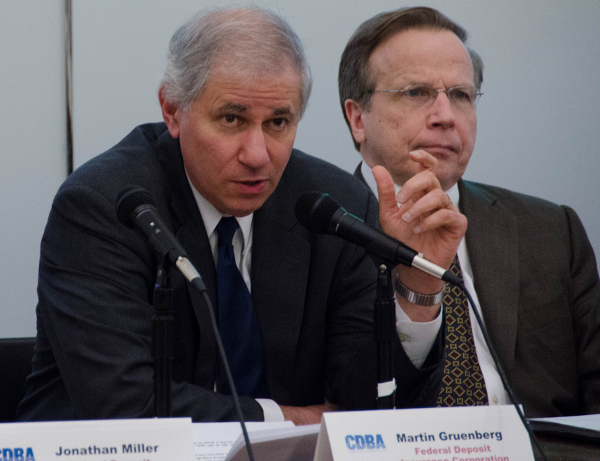News
Six Democrats whose support is crucial to passing the Johnson-Crapo Freddie and Fannie reform bill agreed not to vote for the proposal in a private meeting. The senators were concerned that the structure of the re-insurer intended to replace Fannie and Freddie would be unworkable and that the bill lacked sufficient support for affordable housing goals. Senate Banking Committee Chairman Tim Johnson (D-S.D) and Senator Mike Crapo (R- Idaho) still have the backing of six Democrats and six Republicans on the 22-member committee. However, Senate Majority Leader Harry Reid (D-Nev.) has said the bill needs more support from Democrats before he will bring it to the floor.
The CDFI Fund has opened the application period for the CDFI Bond Guarantee Program. The program is intended to support CDFI lending and investment by providing a source of long-term, patient capital to CDFIs. Up to $750 million in total bond guarantee authority is available in this round. The minimum guarantee size is $100 million. Application materials are available on the CDFI Fund’s website. Qualified Issuer applications must be submitted by June 23, 2014. Guarantee applications must be submitted by June 30, 2014. The CDFI Fund will hold a series of application workshops on the CDFI Bond Guarantee Program in Detroit June 2-3, Washington June 10-11 and San Francisco June 17-18.
U.S. Federal Reserve Governor Daniel Tarullo has called on regulators to revamp a variety of new bank rules, including carving out exemptions for mid-sized banks. Tarullo said regulators should amend their rules to explicitly exempt community banks from the Volcker rule. He also criticized the regulatory approach of Basel III, which allows banks to judge the riskiness of their assets. Tarullo advocated instead for the stress-testing approach administered by the Fed, although he expressed concerns that Dodd-Frank's mandates are needlessly subjecting midsize, low-risk banks to those exams.
The FDIC has published a guide encouraging traditional community banks to partner with CDFIs. The guide identified loan participations as a strength of CDFI banks, enabling traditional banks to manage risk in low- and moderate-income areas while allowing the CDFI bank to make larger loans. Citing several existing partnerships, the report said Chicago-based Community Savings Bank received CRA credit for investing $1 million in certificates of deposit in six CDFI banks, including Urban Partnership Bank, Pan American Bank, Illinois Service Federal Savings and Loan and International Bank of Chicago. Bank Leumi USA also maintains a $100,000 certificate of deposit with Urban Partnership Bank.
A recent analysis by the Federal Reserve Bank of Minneapolis has found that the rate of community bank consolidation has not increased despite the rising cost of regulation. Instead, researchers found the current consolidation rates to be in line with historical trends. In June 2013, the Minneapolis Fed forecasted a decline of 325 community banks by June 2014; the actual decline was 114. That translates to an annual rate of decline of 3.5%, only slightly above the 3% annual decline which characterized the last 20 years. Rising regulatory costs are expected to push 15% of banks with assets below $50 million into unprofitability.
 |
| David Reiling of Sunrise Banks and Faruk Daudbasic of First Eagle Bank lead a discussion of balancing mission with margin. |
The Community Development Bankers Association (CDBA) held its annual Peer Forum, a two day roundtable discussion featuring conversations between community development bank executives and leading community development finance experts, on April 30th and May 1st. This year’s event included discussions led by FDIC chairman Martin Gruenberg and Acting Assistant Secretary for Financial Stability Timothy Bowler.
The meeting, held at the Washington, D.C. office of law firm K&L Gates, was the largest Peer Forum yet with over 50 bankers in attendance from 37 community development banks.
Distinguished Guests
 |
| FDIC Chairman Martin Gruenberg: "Your efforts to serve [low income communities] give you a special place in the financial system of the United States." |
In a wide-ranging discussion, Chairman Gruenberg praised community development banks’ commitment to their social mission and stressed the FDIC’s role in facilitating the banks’ activity. ”Your efforts to serve [low income communities] give you a special place in the financial system of the United States,” Chairman Gruenberg told the bankers. He noted that community development banks “deserve the special attention of bank regulatory agencies because [their] mission is in a fundamental sense a public one as well as a private one.”
In response to inquiries on how the FDIC examiners assess small banks, Gruenberg stressed that FDIC examiners do not consider any one bank asset size ideal and are instructed to defer to banks’ individual discretion. He also addressed findings of the FDIC's recent mobile banking research, urging the bankers to integrate mobile capabilities into their outreach to unbanked populations.
On the second day of the forum, Acting Assistant Secretary for Financial Stability Timothy Bowler engaged the bankers in a conversation on his office's continued efforts to wind down the Capital Purchase Program (CPP) and Community Development Capital Initiative (CDCI) programs. He encouraged input from the assembled bankers on the resolution of the fund, stressing that he hoped to find a way to dispose the assets in a way that both maximizes returns to taxpayers while also keeping Community Banks healthy. “We want to help facilitate your business of making loans in your communities. We want to see you fulfill the mission of TARP by carrying out your mission,” Bowler said.
...The National Community Investment Fund's Banking Industry Annual Report finds the CDFI banking sector leads the rest of the banking industry in both amount of lending in low income areas and number of branches in low income communities. The analysis found that CDFI Banks provide 58.7% of their home mortgage lending to distressed communities, while non-CDFIs provide 23.8%. CDFI banks locate 75% of their branches in distressed communities, compared to 50% for non-CDFIs. The report also noted the increasing health of the sector, finding that 52 of the 75 CDFI Banks included in their analysis had a positive ROAA, and 52 reported positive net income.
A $495,000 grant from the Federal Home Loan Bank of Dallas made through BankPlus to the Housing Authority of the City of Canton, Mississippi will assist 45 low-income homeowners make critical home repairs. This is the latest Affordable Housing Program Grant made through BankPlus. In 2013, the bank facilitated $745,000 in the grants, supporting the creation or rehabilitation of 70 housing units. "The Housing Authority staff has been working diligently to not just obtain repairs for Canton residents' homes, but to identify contractors who will provide quality work and address the long-term needs of homeowners," said Mark Ouellette, BankPlus vice president. "BankPlus is serious about being a good neighbor in our communities."
New York City Mayor Bill de Blasio has announced $8.2 billion in public funds for a 10-year housing plan aimed at providing affordable homes to thousands of low- to middle-income residents. The mayor intends to require developers to include affordable units in residential projects being developed in newly rezoned areas around the city. Mr. de Blasio said that with $2.9 billion in state and federal money and more than $30 billion the city expects to attract in private funds, the projected investment to create and maintain affordable units will total more than $41.1 billion over 10 years. But there could be a downside — the requirement can reduce profits and dissuade developers from building.
Promontory Financial Group is sponsoring the Empowerment Awards to highlight the good work of CDFIs and others that support access to safe, fair financial services in underserved communities. The awards will recognize projects in two categories: The Community Development Banking category for CDFI banks and the Access category for financial and technology firms with less than $10 billion in assets. Prizes will include five pro bono consultations with senior Promontory officials on strategic and regulatory issues, as well as a financial prize of $100,000. CDFIs chosen in either category will receive the financial prize as a direct grant. Applications will be accepted until May 31, 2014. More information is available at www.empowerment.promontory.com.
